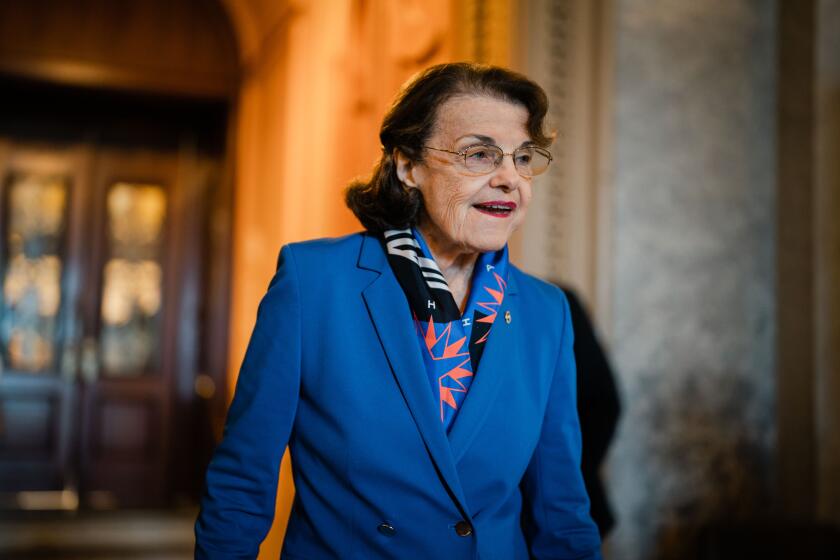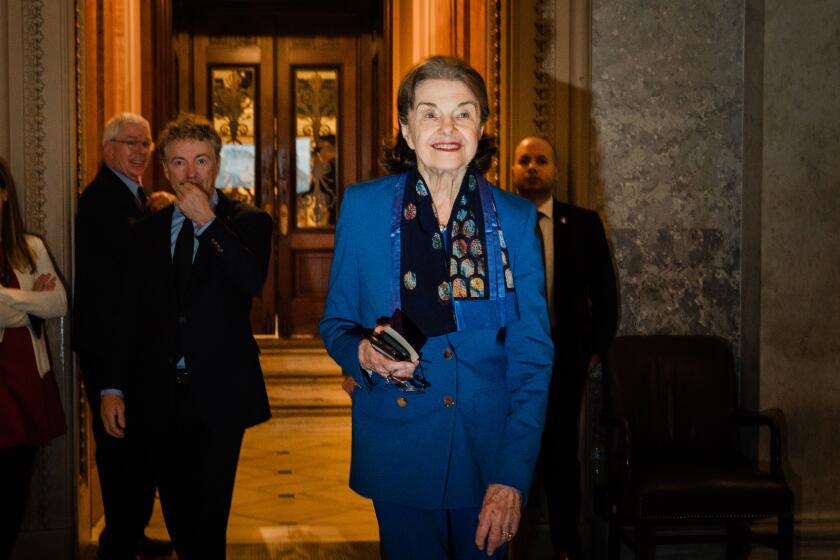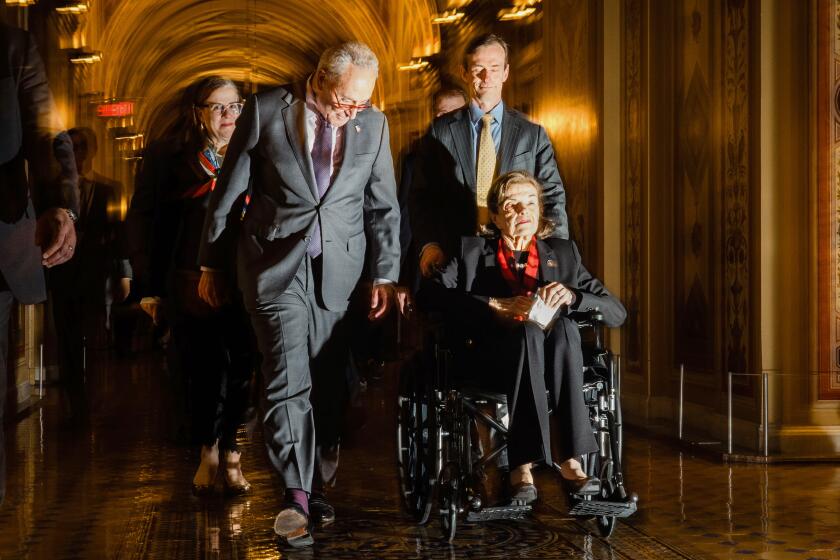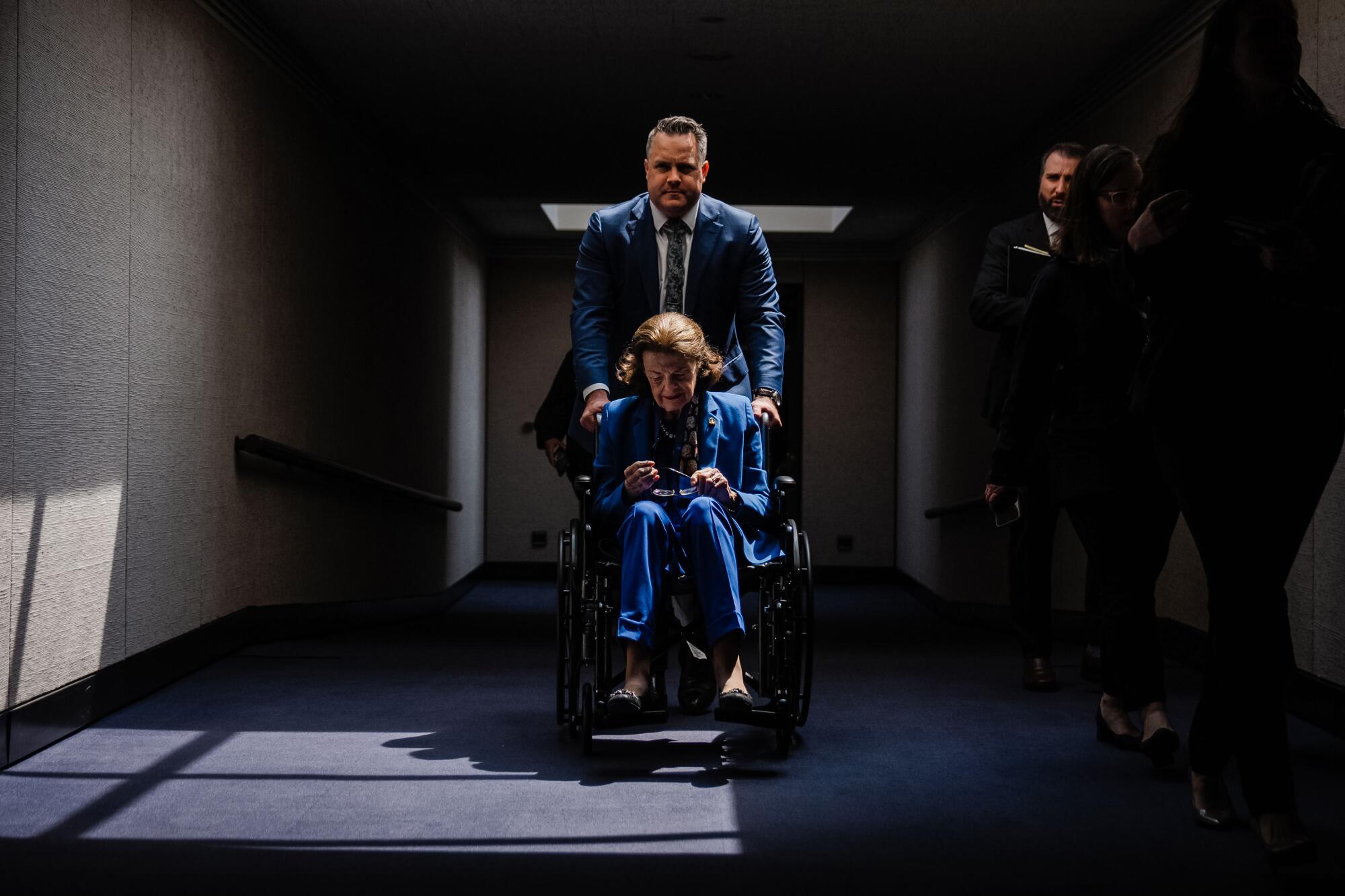
WASHINGTON — An hour into a Senate Judiciary hearing on Thursday, California Sen. Dianne Feinstein was wheeled into the chamber by a staff member. She grabbed his arm tightly to steady herself as she rose to her feet and received a standing ovation after she made the short walk to her seat.
The San Francisco Democrat’s first day back at the Judiciary Committee after an extended absence recuperating from shingles was short. She said little beyond voting on three nominated district court judges who lacked Republican support and thus required backing from every Democrat to advance to the full Senate.
“I’m glad to welcome our colleague, Sen. Feinstein, back to our committee,” Sen. Ted Cruz (R-Texas) said, before adding that she was abetting “several nominees who are so extreme and so unqualified that they couldn’t have a prayer of getting a single Republican vote on this committee.”
The moment of partisan rancor, which followed less biting greetings from her other colleagues, felt almost welcoming in a forum where she has spent decades sparring over judicial nominees. But Feinstein’s nearly three-month absence and homecoming has prompted debate over whether the 89-year-old, who appeared frail when she arrived at the Capitol, should leave before the end of her term. And it has raised broader questions about whether aging lawmakers grow too dependent on their staffs, and if that makes leaving the comforts of Washington that much harder.
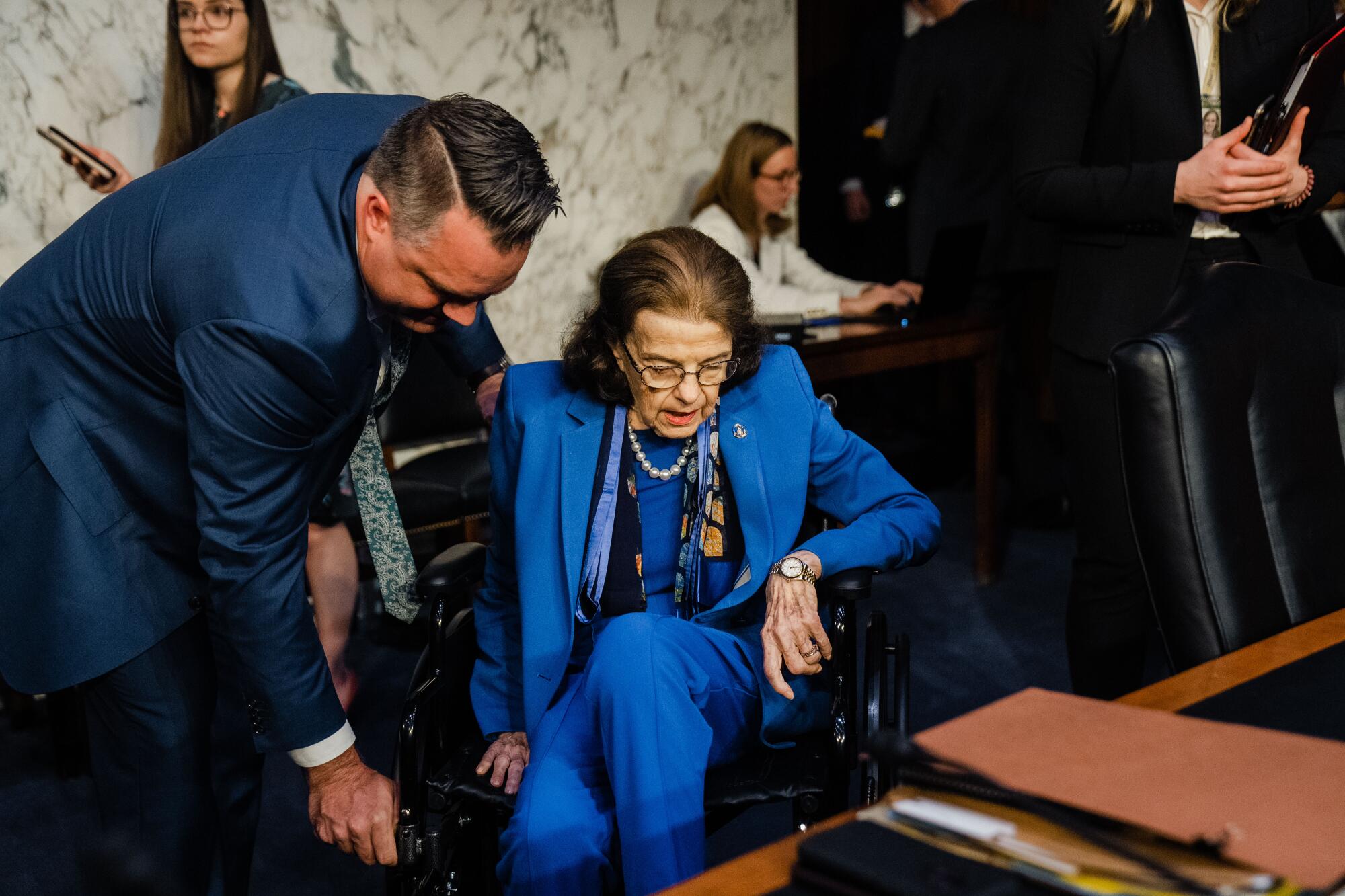
“The Senate can be a very warm, very comforting place for senators,” said James Manley, who served Sens. Edward M. Kennedy (D-Mass.) and Harry Reid (D-Nev.) as an aide from 1990 through 2010. “You have staff to open the doors for you, the Capitol Police at your beck and call. Everyone’s got a smile for you and you have lots and lots of staff to do anything and everything you’re asked to to do.”
Feinstein, who has already announced she won’t run for reelection in 2024, has the financial means for the best home care in the world. But lawmakers become accustomed to life with doting assistants and aides who schedule their lives in 15-minute increments, write their speeches and often drive them to meetings and events. Some even use interns to walk their dogs. New senators and those running for reelection often need the help even when they are in their physical prime. A senator’s life can be exhausting, given the imperative to attend hearings, fundraisers and constituent events all while crisscrossing the country.
“Many members frequently have staffers pick them up in the morning and drive them to a speech and bring them home in the evening from another event,” said Brian Walsh, who worked as a Republican congressional and campaign aide for nearly 15 years. “If you’re doing the job right, you’re basically working 15-hour days.”
After a storied career and prolonged illness, the senator has refused to step down. Some have accused her of clinging to power at the expense of voters.
But that needed support can become enabling, especially in the Senate, where winning an initial term is costly and grueling, and staying for a long tenure is rewarded with even more power.
Manley said he witnessed the real-time decline of several senators, including Thad Cochran (R-Miss.), whose staff would whisper directions in his ear about where to go and what to say. Kennedy juggled his brain cancer treatment with the desire to pass the Affordable Care Act, his career ambition. Manley said Reid and his leadership staff ran the powerful Appropriations Committee near the end of Sen. Robert Byrd‘s long career, before the West Virginia Democrat voluntarily gave up the gavel.
Byrd had access to anything he needed, including world-class healthcare. But the attachment to the Senate was more visceral, Manley said.
“It was everything, especially when his wife and dog died,” Manley said. “Unfortunately, senators lose some perspective and don’t think they can live without being a senator.”
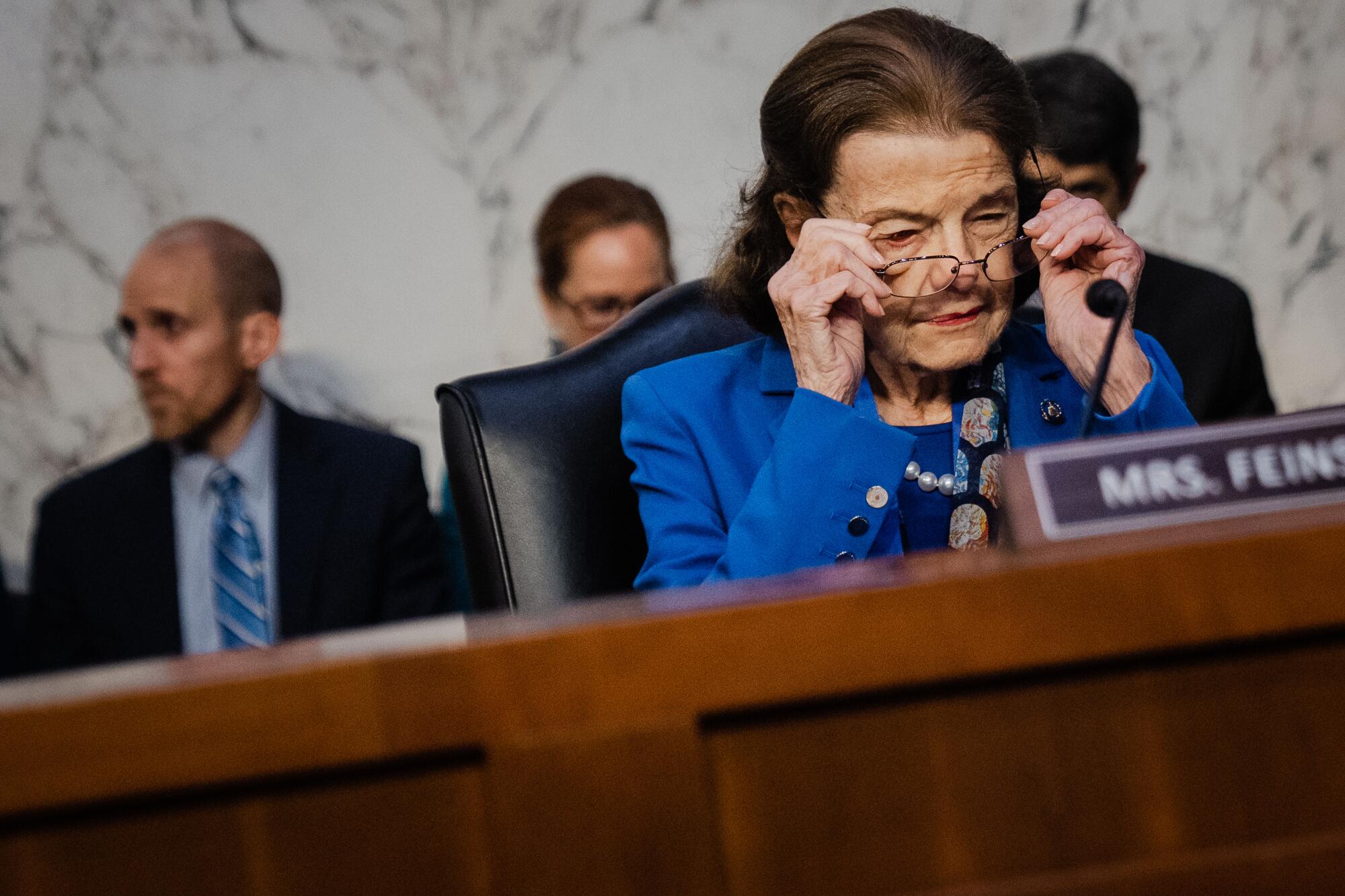
John Lawrence, a former chief of staff to Rep. Nancy Pelosi (D-San Francisco), said the Byrds of the world are the exception and that few if any lawmakers stay in office purely for the support. Large staffs “can only insulate you so far” from the rigors of travel and overlapping meetings, he said.
Mary Bono, who spent 15 years representing Palm Springs as a Republican member of the House, said it can be difficult for younger lawmakers who leave to get used to life without a full-time team around them. But she believes older members like Feinstein — whose distinguished career often landed her at the center of world events — have an even harder time adjusting to the diminished pace. The phone doesn’t ring as much and the world no longer sees you as in the mix, she said.
“Not many other professions or careers are you so interested in the front-page news as you are because you used to be a part of it,” Bono said. “Now you’re just reading it.”
The sight of Feinstein being wheeled through the Capitol’s halls with a retinue of photographers and cameramen in tow underscored how eager the public was to get a sense of her well-being. Beyond her shingles diagnosis and that she was hospitalized, the senator has revealed little about her health or how much she’s been working — aside from statements asserting that she’s been staying updated by staff from San Francisco as she recovered.
Sen. Dianne Feinstein had been away from the Capitol for more than two months after experiencing complications from the shingles virus.
Feinstein has long been known as not only powerful but hands-on — demanding, for example, to edit media advisories before they were sent out. On Thursday, as the nomination for a district judge position came up in her committee, she read her yes vote from a note and then asked to be recorded as voting in person on three other judges whose nominations were raised before her arrival. One aide whispered exuberantly into her ear. Another brought her coffee. Aides appeared to adjust the height of her chair before she arrived at the hearing.
Democrats also worked around her, voting in three nominees who had bipartisan support before her arrival, when her vote was not needed. Feinstein said in a news release Wednesday that her doctors “have advised me to work a lighter schedule” as she resumes her Senate career.
One Feinstein staff member said the senator would decide which votes and hearings to attend on a case-by-case basis. But Thursday’s hearing suggested she would probably skip votes when it was not crucial for the Democrats, who hold a 51-49 majority in the Senate.
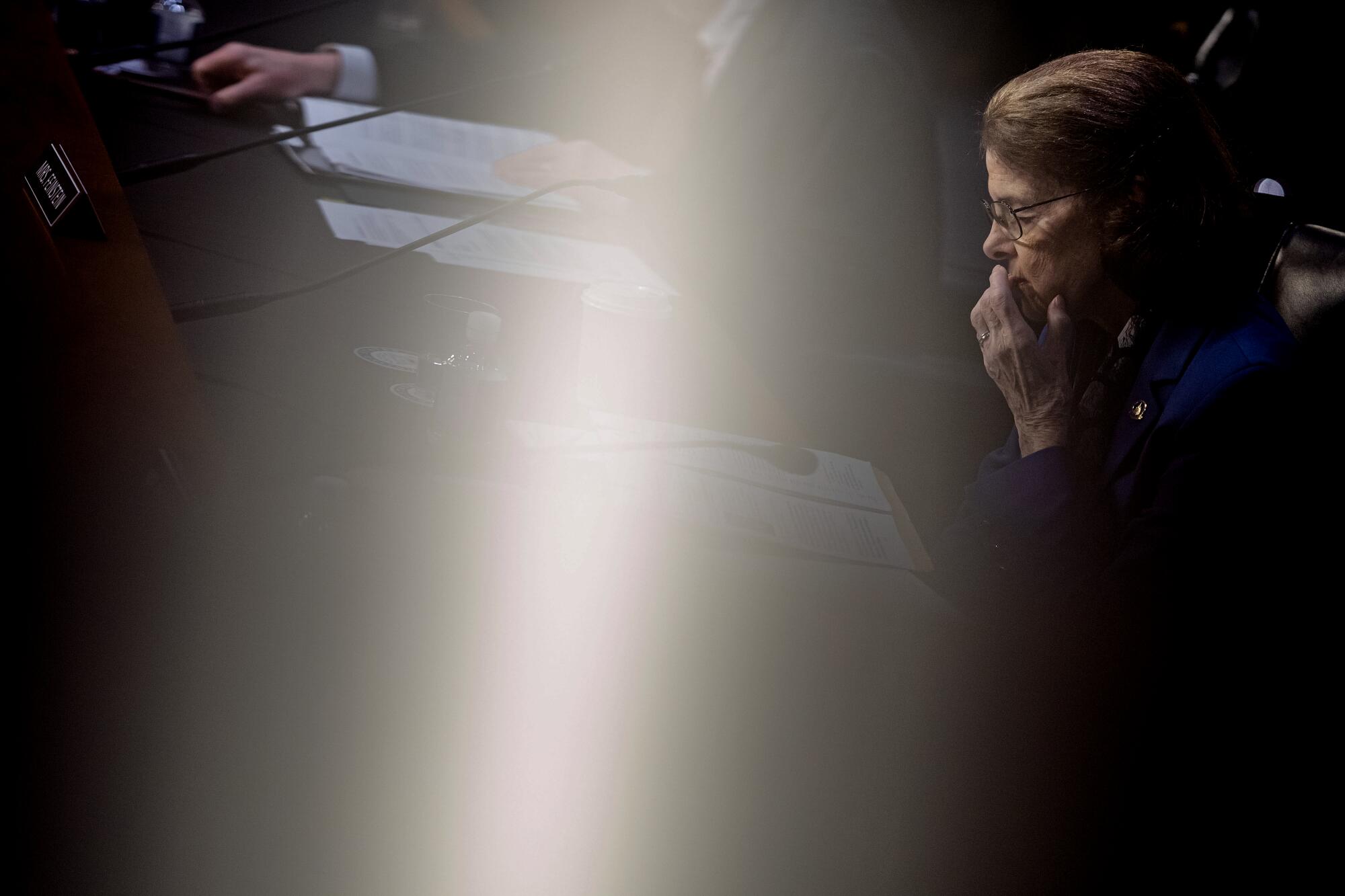
Feinstein’s vote Thursday helped District Court nominees Charnelle Bjelkengren, Kato Crews and Marian Gaston pass out of committee. Democrats pushed back forcefully at Republican assertions that the three weren’t qualified. Sen. Alex Padilla was quick to come to the defense of Gaston — who is a San Diego County Superior Court Judge.
After the vote, Padilla quickly went to greet Feinstein and wish her well.
“It’s great to have her back,” he said.
Sen. Dianne Feinstein voted Wednesday in the Senate for the first time since she left in mid-February for an extended absence due to the shingles virus.
As she left the Judiciary Committee, reporters asked why she had returned now. “Felt better,” she said with a laugh. She then was asked about the need to raise the country’s borrowing limit — one of the biggest controversies in Washington — and responded that she was getting up to speed on the subject “and read a lot of material.”
After the hearing, Feinstein spent time in an office she keeps right off the Senate floor. Then, around 2 p.m., after voting, she was wheeled by her staff to a waiting car and left the Capitol.
More to Read
Sign up for Essential California
The most important California stories and recommendations in your inbox every morning.
You may occasionally receive promotional content from the Los Angeles Times.
